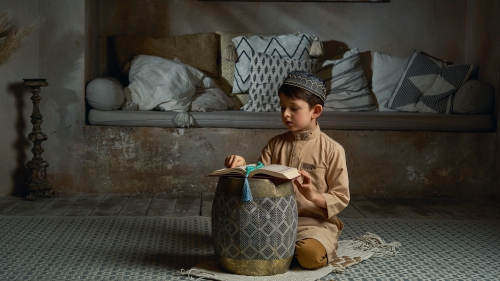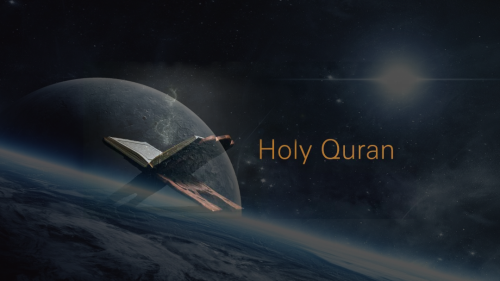Proof of God in Intelligent Design?

I have traveled a lot around the United States and the United Kingdom, lecturing to Muslim audiences. One common trait I have noticed is the concern Muslims feel for the future of their children. Several conferences I attended had topics such as “Saving Our Families” or “How to Raise Our Children as Good Muslims.” The reason for this concern is obvious: These Muslim families are living in a highly secularized society that has cultural traits that are destructive to traditional values. The profane culture of MTV, pornography, consumerism and hedonism—what political scientist Benjamin Barber calls “The McWorld”—is at odds with Muslim values.
The McWorld is powerful in winning converts. Many Muslim parents living in the West are dismayed to see their kids envying the lives of pop-stars instead of Islamic sages. The solution many Muslim families find is to create cultural enclaves where, they hope, the McWorld cannot penetrate. They want to educate their children in local Islamic schools and keep them in an “Islamic atmosphere” as much as they can. However, such cultural enclaves have little chance of matching Western society in terms of appeal. For Muslim youngsters living in the United States or in Western Europe, the popular profane life is colorful and attractive. They may not lose their faith altogether, but they lose a coherent identity based on that faith. They become cultural wanderlings.
The resulting psychological trauma in these young people can have a much worse side effect: As we have seen in the September 11 conspirators, an identity crisis can turn some young Muslims into terrorists. Seeking asylum from the distress they feel for being renegade Muslims, they think they can find peace in a radical political ideology, a kind of necrophilic nihilism, hidden under the cloak of Islam.
Let’s Face Modernity
But perhaps Muslims don’t need those cultural enclaves. The colorful life of the West that we call modernity may not be totally bad, but only in some of its aspects. There might be no problem in wearing jeans, eating fast food—health problems notwithstanding—or listening to pop music as long as one knows that God exists and that he has a moral obligation to Him. If a young person gains this consciousness, in fact, he will be more powerful and confident in the modern world, by being open to its opportunities and offerings, but consciously aware of the necessity of maintaining his integrity and moral standards.
Materialism is the philosophy that argues that matter is all there is. It denies the existence of all spiritual entities, and, of course, God. The core issue, surely, is to have faith in God and see the world out of Godly hearts and minds. Once a believer is standing firmly on that solid ground, he doesn’t need to close the door to foreign cultures. When he has achieved a continuing consciousness of God, then he walks with God in every path that life opens for him.
Yes, but how will the Muslim achieve that consciousness?
To find an answer, first, we have to understand the problems we face. The problem with modernity is its neglect of the divine: It makes people live as if God does not exist. Only doctrinal atheists declare the Nietzschean claim “God is dead,” but many ordinary people live as if this is reality. Movies, books, soap operas, and songs portray a lifestyle in which nobody thinks about God. He is absent from their minds, yet they have an appearance of happiness. Advertisements impose the big lie that we can find happiness by consuming some special product. Insurance companies are what people trust. Popular science ascribes to us humans a nature that has originated wholly by natural laws. And opinion leaders dismiss religion as a thing of the past.
The Qur’an tells us that Prophet Shu`aib (peace and blessings be upon him), who was sent to the people of Madyan, warned them that they [neglect God as a thing cast behind your back] (11:91). This is the dominant culture in today’s world. Man turns his back on God and rarely gives Him any thought. But this neglect does not result merely from ignorance or lack of thought. There is a doctrinal basis for the modern neglect of God. That basis is a grand narrative lying beneath every aspect of the secular world. It is called materialism, and it is the principal foe we must face and deal with.
Materialism Is Our Adversary
Materialism is the philosophy that argues that matter is all there is. It denies the existence of all spiritual entities, and, of course, God. According to a materialist, the universe is not created by God; it is self-existent. He, therefore, assumes that everything in the universe, including the life within it, is the product of blind, purposeless forces of physics and chemistry. Materialism denies the existence of the human soul, too. According to this view, we are nothing but highly organized molecules, and our ideas, feelings, and emotions are simply chemical reactions inside our brain cells. In short, materialism is the philosophical underpinning of atheism.
Since its beginning, Islam has carried on an intellectual war against materialism. The Qur’an emphasizes the irrationality of men’s denial of God: [How do you deny God when you were dead and He gave you life? Again He will cause you to die and again bring you to life, then you shall be brought back to Him] (2:28).
Yet the sharpest encounter between Islam and materialism occurred when medieval Muslims read the works of the philosophers of ancient Greece and translated them into Arabic. Some of those ancient Greeks were materialists. They argued that the universe had no beginning, that it existed from eternity. This idea seemed attractive to some Muslims of the time. That is why Imam Ghazali, the Muslim equivalent of Thomas Aquinas, wrote extensively against “the philosophers” and their materialism, especially in his monumental work The Incoherence of the Philosophers. Ghazali insisted that the universe was created ex nihilo (from nothingness) and this was evidence for the divine. It is interesting to note that Ghazali’s thesis was confirmed in the 20th century with the commonly accepted big bang theory, which implies a beginning for the material universe.
Ghazali’s powerful authority expelled materialism from Muslim minds for a long time, but it reappeared in the 19th century. Europe of that time was flooded with materialist theories from thinkers like Marx, Darwin, Comte, Durkheim, and Freud. The Westernized intellectuals of Islamic lands, especially of the late Ottoman Empire, were influenced by these theories and became voluntary tools in transferring them to their societies. Atheists or agnostics like Abdullah Cevdet or Suphi Ethem, quoted the works of Charles Darwin and Ernst Haeckel to argue that man is a mere animal. Muslim thinkers countered their arguments. Ismail Fenni Ertugrul, for example, in his book The Collapse of the School of Materialism argued that the universe is not a self-existing entity as the materialists claim; it was created by God. Ertugrul also explained that the universe and life within it are designed by God and they tell us about His infinite might and knowledge.
After the collapse of Ottoman Empire in 1918, the war of ideas continued in former Ottoman states, especially in the most Westernized one of all, Turkey. Materialist theories quickly became the worldview of the Turkish intelligentsia and the ruling paradigm in the country’s education system. This is why Said Nursi (1878-1960), probably the most influential Muslim scholar in Turkey for the whole 20th century, put great emphasis on the fight against materialism. During the Second World War, he urged his followers to concentrate on the greater war, the war of ideas. The biggest problem, he said, is that “many are losing their faith because of the plague of materialism.” Based on the same conviction, contemporary Muslim intellectuals like Harun Yahya put great emphasis on the case against materialism and its main pillar, Darwinism.
There is no inherent clash between Islam and Christianity. That emphasis is right on target. Materialism is the problem Muslims have with the modern world, and it is the worldview we must stand against. Muslims should have no objection to modern science and technology, art and esthetics, the good things of life and open society. Our objection should be against the intellectual “plague” which invades our lives and leads people to believe in a godless world.
So the way to save our faith and our families in the modern world is not to shut them away from it, but to understand and refute its underlying misconceptions. This will give us dignity and integrity and may help others to see the ultimate reality. But how can we refute materialism, a philosophy so powerfully incorporated into the most powerful civilization, the West?
Well, there is good news. We are not alone in this battle. There is another powerful component in the West that is determined to root out materialism. That force is Christianity.
Christianity as Our Ally
Some political conflicts in history, like the Crusades of the medieval age or the allegedly “Islamic” terrorism of today, have created mistrust between many Christians and Muslims. However, there is no inherent clash between these two great religions. From the Muslim point of view, in fact, Christians are the closest friends and allies in the world. The Qur’an boldly declares [Nearest among men in love to the believers will you find those who say, ‘We are Christians’: because amongst these are men devoted to learning and men who have renounced the world, and they are not arrogant] (5:82).
Muslims share many details of faith with Christians. Besides our common faith in God the Creator, we both believe that Jesus Christ was the Word of God (An-Nisaa’ 4:171) and that he had a virgin birth and performed many miracles (Al-Ma’idah 5:110). Islamic tradition also holds that Jesus will return towards the end of time and save humanity from unbelief.
Our common faith in God is so important that God commands Muslims to make a call for alliance to Christians and Jews, the People of the Book (Scripture): [Say: O People of the Scripture! Come to an agreement between us and you: that we shall worship none but God, and that we shall ascribe no partner unto Him, and that none of us shall take others for lords beside God] (Aal-`Imran 3:64).
Based on this Qur’anic vision, we can confidently conclude that Muslims should cooperate with faithful Christians and Jews in matters that are important to each of these three monotheistic faiths.
And what can be more important than the case against materialism, the modern denial of God?
Intelligent Design as Our Common Cause
Interestingly, Said Nursi, in the 1950s, foresaw an alliance between Islam and Christianity against materialism. He prophetically wrote, “A tyrannical current born of naturalist and materialist philosophy will gradually gain strength and spread at the end of time, reaching such a degree that it denies God. … Although defeated before the atheistic current while separate, Christianity and Islam will have the capability to defeat and rout it as a result of their alliance” (Nursi, Letters, s. 77-78). Half a century after Nursi, the stage for that alliance is set.
Intellectual Muslims, fed up with the pathological anti-Western hatred of the radicals who defame Islam by their violent acts, are seeking the right way to express and stand for their faith and identity in the modern world.
Intellectual Christians have already found that way. They encountered materialism before we did because it grew right in the heart of Christendom. They have been standing against it for several decades. And recently they have initiated a bold movement—a “wedge” as they call it—to split the foundations of materialism.
This “wedge” is the code name for the Intelligent Design Movement, formed in the early 1990s by Christian scientists and intellectuals. The leader of the movement is Phillip E. Johnson, a prominent professor of law from the University of California, Berkeley. During a sabbatical year in London in 1987, Dr. Johnson read about Darwinism and noticed that Darwinian ideologues like Richard Dawkins use deceptive arguments to sell their unsubstantiated story. He decided to dedicate the rest of his life to unravel this sophisticated fallacy. His first book, Darwin on Trial (1991), annoyed the Darwinist establishment terribly, but it was just a beginning. In the following years, serious scientists like Michael Behe from Lehigh University, William Dembski from Baylor University, and Paul Nelson from the University of Chicago joined the ranks of the movement.
Today the movement, headed by the Discovery Institute in Seattle and the Intelligent Design Network in Kansas, is leading a great battle first to free school textbooks and then the whole of society from the Darwinist dogma and the materialist philosophy it supports.
Hundreds of verses in the Qur’an call people to examine the natural world and see in it the evidence of God.
Intelligent Design (ID) is a term that implies creation. The universe and life are not products of blind forces of nature, ID holds, but show evidence that they were designed by an intelligence. The ID Movement has deliberately chosen not to specify the identity of the Designer. Through science, you can demonstrate convincingly that there is a designer, but you can’t go further without invoking theology. Everybody has the right to believe in a Designer according to his own theology. What makes the movement effective is its emphasis on solid scientific evidence.
This non-theological nature of the ID Movement also makes it inter-religious. Whether you are a Christian, a Jew, a Muslim, or any other kind of theist, you can identify with the movement. This movement defines the particular paradigm of science we would like to have, and it is science that defines society in the long run.
Muslims should also note the great similarity between the arguments of the Intelligent Design Movement and Islamic sources. Hundreds of verses in the Qur’an call people to examine the natural world and see in it the evidence of God. Great Islamic scholars like Ghazali wrote large volumes about design in animals, plants, and the human body. What Intelligent Design theorists like Behe or Dembski do today is to refine the same argument with the findings of modern science.
In short, Intelligent Design is not alien to Islam. It is very much our cause, and we should do everything we can to support it. A Call for Action Here are a few suggestions: If there should be a clash in the 21st century, it should not be between Islam and the West, but between theism and materialism.
Muslim Students: Go and learn about Intelligent Design. Learn why Darwinism is wrong. Then raise this issue in your classrooms. Question your biology teachers and your textbooks. Form Muslim Student Associations and get in touch with the Intelligent Design groups in your area. Organize lectures by ID scientists and write under the title “The Fall of Darwinism, The Greatest Myth Ever.”
Muslim Families: If you have children in schools, pay attention to their biology classes. Are they being indoctrinated by the myths of Darwinism? If so, appeal to your school board and question this theory by appealing to the work of the ID scientists. Get help from Christian families who support the Intelligent Design cause in your school board.
Muslim Intellectuals: Write and speak about this in your newspapers, magazines, Web sites, lectures, speeches, khutbahs (sermons), and the like. We cannot raise a Muslim generation by merely speaking about the Islamic victories in the past; we have to do something for today. And don’t think that Darwinism is compatible with Islam by referring to some vague theories of limited evolution developed by some medieval Muslims. The real issue at stake here is not whether some organisms have a common ancestor or not. The real issue is whether life is created by God or evolved by itself. We cannot be neutral on this. We have to defend faith against unbelief. This is our raison d’être, the reason why we exist. If Muslims get involved in this debate, they will help both themselves and Western society. They will also see their common values with Christians more clearly. This alliance will help counter the doomsday calls for a “clash of civilizations.” In fact, if there should be a clash in the 21st century, it should not be between Islam and the West, but between theism and materialism. And since the battlefields in this clash are labs, lecture halls, and Web sites, it will be a much safer place for controversy.
Topics: Creation And Evolution, Islam And Science
Views: 3735
Related Suggestions

















